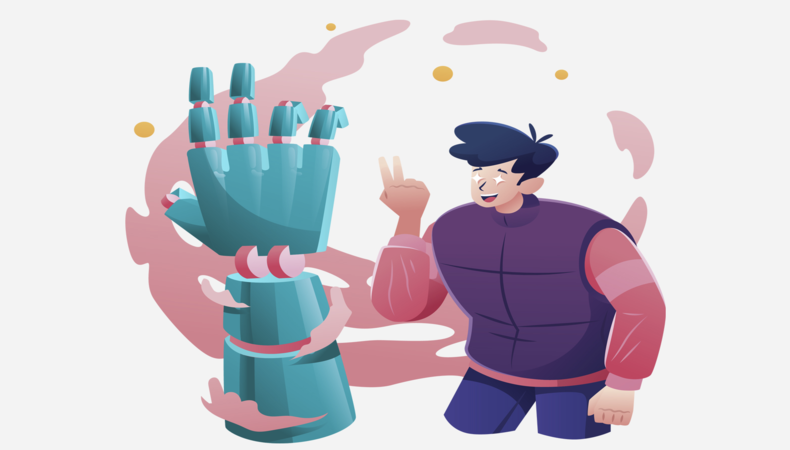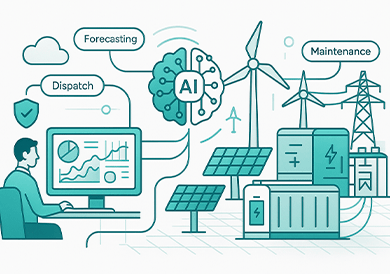
Though machines haven’t replaced humans in IT product development yet, the future of software testing is definitely automated. While in 2020, three-quarters of software companies were equally implementing artificial intelligence in testing alongside manual checks, 2022 turned out to be a software testing evolution, raising the bid to 97%.
What’s behind this boom? AI in testing automation speeds up the development process and allows for building a stable product serving a great number of users. And though automated testing can slow down the development at the initial stage, AI benefits outnumber its limitations: the functionality remains working after the new changes, it withstands the high workload, and the customer is satisfied with the smooth performance of the software.
But the question is how to combine QAs, developers, and new OpenAI tools in one working mechanism. Let’s dig deeper with Patternica!
How AI can be used to improve software testing?
In today's reality of heated competition, businesses are seriously thinking about accelerating product delivery through automated test script writing. Hence, by using artificial intelligence in software testing, they’re trying to beat two birds with one stone: enhance the quality assurance workflow and quickly adjust the product to constant changes. That’s possible only with the Agile development methodology, which makes artificial intelligence testing unavoidable.
Advantages of using GhatGPT in software testing
If you’re now thinking about how to write automated test scripts, consider ChatGPT. This trendy language model analyzes tons of data to identify self-learning patterns and generate test automation scripts, write and debug code, find gaps in your software product, get architectural and infrastructure options, etc. We believe its popularity skyrocketed to 1 million users in 5 days for a reason, so let’s discuss its pros below.
- Improving code resiliency. That’s the main point that is usually underestimated by the manual QA testers who often miss it out or lack resources for it.
- Prioritizing security. By adding artificial intelligence to test automation, testers pave the way for creating a safe IT product, revealing the code vulnerabilities and ensuring it’s secure by default.
- Addressing limitations. As GhatGPT is a low-code development toolkit, companies can fill in the team’s expertise gaps with the help of AI technology. For instance, if you don’t have an expert in GitHub workflows, you can switch to ChatGPT to generate code to make cloud-based repository work for your product.
- Taking code debugging to a new level. Being forced with the artificial intelligence software, you raise chances to find out the exact reason for an output response failure and see the clear ways for product improvement.
- Saving the planning time. AI QA automation tools, such as ChatGPT, aid testers in deeply analyzing the software using sliders on each screen while working on test case scenarios. As a result, the deliberate examination saves planning time.
Techniques of ChatGPT in software testing
Now that you know the major benefits of automated testing with GPT scripts, it’s time to elaborate on its key use cases:
- Test case generation. It may start small with writing test cases for Google testing and go further to a list of test cases for a login form.
- Code writing. That is the key breakthrough of ChatGPT, which is currently available in multiple programming languages, leveraging the latest technologies, and implementing the most widespread test automation frameworks.
- Creation of a complex test automation pipeline. After following the easy-to-go guidelines on how to use the code, ChatGPT allows testing an app with CI/CD steps and bash code scripts.
Inspired to give it a try? Don’t hurry up, as though artificial intelligence software can help you to write code or test cases to reduce the time to market, it cannot help you build a full-fledged product. So, here we come to the issue of automated quality assurance.
Role of Artificial Intelligence in Quality Assurance
Even though AI can significantly ease up the developers’ life, there’s still a need for quality control of training data. And that’s the moment when human experts, developers and testers, enter the stage to teach AI models to process the patterns accurately and unbiasedly. Only in this case, the machine will make the right inferences which will satisfy the hyperparameter configuration. Consequently, it’ll mean that the model is adapted to real-life scenarios and is able to perform the task at the required capacity.
How can AI be applied to the quality assurance process?
Depending on the phase of the software product development, one can execute different kinds of tests and checks. But more often, the interconnection between AI and AQ is felt in these situations:
Case #1. Pilot and data annotation
This is the outset stage of the QA process when you’re determining the problem that should be solved and start collecting the data to investigate it profoundly. Here, QA plays the role of data inspector verifying that the data used for model training meets the quality standards.
Case #2. Test, validation, and scaling
It’s the heart of the QA procedure which involves model building, testing how it works, and its adjustment to serve the wider TA. The duty of the QA specialist is to confirm that the model complies with the expected behavior patterns and quality requirements. This is especially important when it comes to the real data put under its hood.
Case #3: Retraining of the model
QA should get involved in the process when the model is ready, but you’re aiming at making it run even more accurately. To achieve this result, the regularity of retraining matters as well as the review of QA metrics compliance.
Future of software testing: Our verdict
Automated testing is the last word in the list of approaches to deploying a stable and load-bearable software product. With such low-code OpenAI technologies as ChatGPT, developers and testers can save a lot of time and speed up product building. However, the role of human QAs is still unquestionable as the limitations of AI testing are still critical: it needs to be taught, checked at each stage, and retrained to perform accurately. Hence, humans and machines are still interdependent in their goal to deliver high-quality software.
Patternica can provide you with skilled developers to leverage AI technology for your project’s success. Contact us!

.png)
.png)